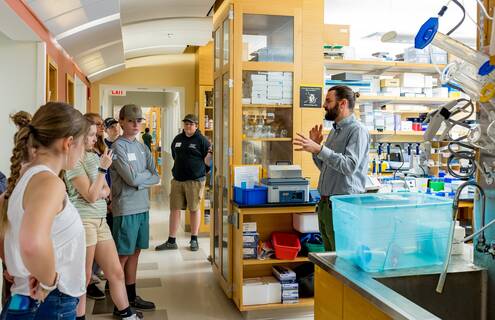
I organized this project because I wanted students to understand how the concepts and content we study in high school biology are being used to solve problems and improve lives.
Rachel SandersBefore medical students and PhD candidates arrive at Dartmouth Cancer Center for the hands-on experience that prepares them to become the next generation of doctors and scientists, they are children and teenagers. Many have a pivotal moment in their life that leads them toward wanting to care for patients with cancer and discover breakthrough treatments and cures. Maybe it was a personal experience with cancer or inspiration from a mentor. Maybe it was a field trip like when 37 ninth-graders from Rivendell Academy in Orford, NH, stepped behind the curtain at Dartmouth Cancer Center to see science and discovery in action.
From concept to fruition
Piloted as a concept program several years ago, the field trip, which supports the class’s major unit on cancer, got an upgrade this year by Dartmouth Cancer Center organizers Linda S. Kennedy, Associate Director for Strategic Initiatives and Global Oncology, and Steven N. Fiering, PhD, Associate Director for Cancer Research Training and Education.
The students were divided into 14 teams, each with a subject they have been investigating. Between tours of science labs, the students conducted video interviews of more than a dozen enthusiastic experts. Cancer Center staff, clinicians, PhD students, fellows and research scientists stepped up to show and tell about cancer topics ranging from artificial intelligence to zebra fish. The day concluded with lunch and a short assembly of presentations, including a talk on how we can prevent 50% of cancers, and a video of the DaVinci robotic surgery instrument used by specially trained surgical oncologists.
The most important thing you learned
“There is not really a ‘most important thing’ that I learned from this project,” said student, “SJ.” “I learned about epigenetics, but I also learned that humans still have so much to learn. I cannot say that one is more important than the other. I found epigenetics fascinating, but I am also intrigued by the mysteries we have yet to uncover.”
“Being able to see all the labs and workspaces where a lot of the people worked at Dartmouth Cancer Center throughout the field trip was really fascinating,” adds student, “MC.”
Back at school, each team produced a model and video to explain something complicated about their chosen topic. The student-produced videos were presented at a special evening assembly to showcase what they had learned. Several cancer experts who took part in the field trip also attended.
“The most important message from our video was that the treatments for cancer are improving. Science has been changing and new treatments have been discovered. People with cancer have a higher chance of surviving than ever before,” said student “JB” about their project.
Place-based learning
Rachel Sanders, the Rivendell Academy science teacher who led the unit says her students were so engaged and the presentations were fabulous. “I organized this project because I wanted students to understand how the concepts and content we study in high school biology are being used to solve problems and improve lives. I wanted them to see what science research looks like at a professional level and I wanted them to interact with experts in the field,” she says.
“Rachel Sander’s cancer unit utilized place-based learning theory and it was our privilege to bring students into the labs and show them how we are tackling the most exciting questions of how to prevent and treat cancer in humans,” adds Kennedy. “We’re committed to recruiting the next generation of scientists to cancer research and the opportunity to talk directly with students about the thrill and need for discovery science was too good to pass up.”
A few minutes of a presentation may have been a pivotal moment for any of these students to find themselves one day as a presenting scientist. And if not, Sanders notes that everyone will interact with medical professionals—she wanted them to leave her class with the confidence to understand their doctors and advocate for themselves and their family members.
Either way, organizers look forward to the project becoming an annual tradition.